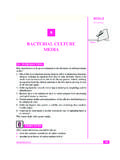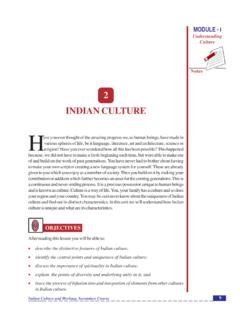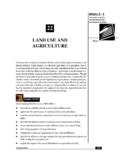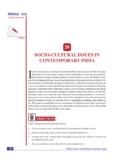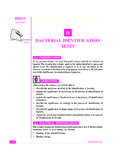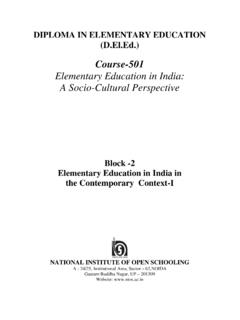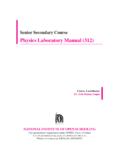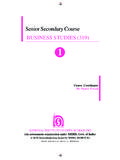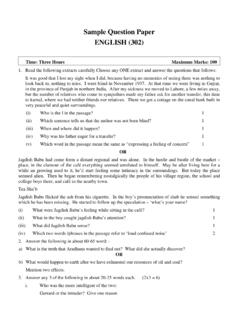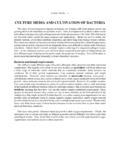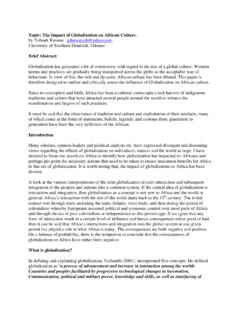Transcription of 1 CULTURE: AN INTRODUCTION T
1 culture : An IntroductionNotes 1 Indian culture and Heritage Secondary CourseMODULE - IUnderstandingCulture1 culture : AN INTRODUCTIONThe English word culture is derived from the Latin term cult or cultus meaningtilling, or cultivating or refining and worship. In sum it means cultivating and refininga thing to such an extent that its end product evokes our admiration and is practically the same as Sanskriti of the Sanskrit language. The term Sanskriti hasbeen derived from the root Kri (to do) of Sanskrit language. Three words came from thisroot Kri; prakriti (basic matter or condition), Sanskriti (refined matter or condition)and vikriti (modified or decayed matter or condition) when prakriti or a raw material isrefined it becomes Sanskriti and when broken or damaged it becomes vikriti.
2 OBJECTIVESA fter studying this lesson you will be able to: understand the concept and meaning of culture ; establish the relationship between culture and civilization; Establish the link between culture and heritage; discuss the role and impact of culture in human life. CONCEPT OF CULTUREC ulture is a way of life. The food you eat, the clothes you wear, the language you speak inand the God you worship all are aspects of culture . In very simple terms, we can say thatculture is the embodiment of the way in which we think and do things. It is also the thingsCulture: An IntroductionNotesIndian culture and Heritage Secondary Course 2 MODULE - IUnderstandingCulturethat we have inherited as members of society.
3 All the achievements of human beings asmembers of social groups can be called culture . Art, music, literature, architecture, sculpture,philosophy, religion and science can be seen as aspects of culture . However, culture alsoincludes the customs, traditions, festivals, ways of living and one s outlook on variousissues of thus refers to a human-made environment which includes all the material and non-material products of group life that are transmitted from one generation to the next. Thereis a general agreement among social scientists that culture consists of explicit and implicitpatterns of behaviour acquired by human beings.
4 These may be transmitted through symbols,constituting the distinctive achievements of human groups, including their embodiment asartefacts. The essential core of culture thus lies in those finer ideas which are transmittedwithin a group-both historically derived as well as selected with their attached value. Morerecently, culture denotes historically transmitted patterns of meanings embodied in symbols,by means of which people communicate, perpetuate and develop their knowledge aboutand express their attitudes toward is the expression of our nature in our modes of living and thinking.
5 It may be seenin our literature, in religious practices, in recreation and enjoyment. culture has two distinctivecomponents, namely, material and non-material. Material culture consists of objects thatare related to the material aspect of our life such as our dress, food, and household culture refers to ideas, ideals, thoughts and varies from place to place and country to country. Its development is based on thehistorical process operating in a local, regional or national context. For example, we differin our ways of greeting others, our clothing, food habits, social and religious customs andpractices from the West.
6 In other words, the people of any country are characterised bytheir distinctive cultural traditions. INTEXT QUESTIONS How can you say that culture and Sanskriti carry the same meaning?_____2. Fill in the blanks:a. All the achievements of human beings and groups can be culture has two distinctive components viz. material : An IntroductionNotes 3 Indian culture and Heritage Secondary CourseMODULE - IUnderstandingCulture culture AND CIVILIZATIONThe word culture and civilization are often used synonymously. However, they haveclearly defined meanings differentiating them.
7 Civilization means having better ways ofliving and sometimes making nature bend to fulfill their needs. It also includes organizingsocieties into politically well-defined groups working collectively for improved conditionsof life in matters of food, dress, communication, and so on. Thus some groups considerthemselves as civilized and look down upon others. This disposition of certain groups haseven led to wars and holocausts, resulting in mass destruction of human the other hand culture refers to the inner being, a refinement of head and heart.
8 Thisincludes arts and sciences, music and dance and various higher pursuits of human lifewhich are also classified as cultural activities. One who may be poor and wearing cheapclothes may be considered uncivilized , but still he or she may be the most cultured possessing ostentatious wealth may be considered as civlilized but he may not becultured Therefore, when we think of culture , we have to understand that it is different from we have seen, culture is the higher levels of inner refinement of a human being. Humansare not merely physical beings.
9 They live and act at three levels: physical, mental andspiritual. While better ways of living socially and politically and better utilization of naturearound us may be termed as civilization. This is not enough to be cultured. Only when thedeeper levels of a person s intellect and consciouness are brought into expression can wecall him/her cultured . INTEXT QUESTIONS What is the difference between culture and civilization?_____2. Give two similarities of culture and culture AND HERITAGEC ultural development is a historical process.
10 Our ancestors learnt many things from theirpredecessors. With the passage of time they also added to it from their own experienceand gave up those which they did not consider useful. We in turn have learnt many thingsfrom our ancestors. As time goes we continue to add new thoughts, new ideas to thosealready existent and sometimes we give up some which we don t consider useful anyCulture: An IntroductionNotesIndian culture and Heritage Secondary Course 4 MODULE - IUnderstandingCulturemore. This is how culture is transmitted and carried forward from generation to nextgeneration.
